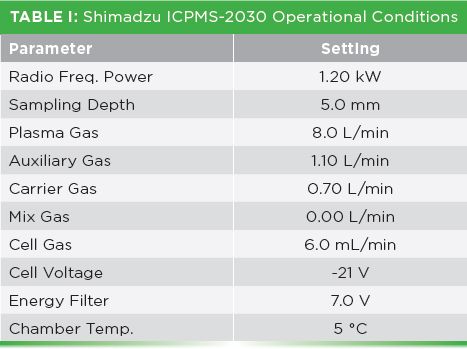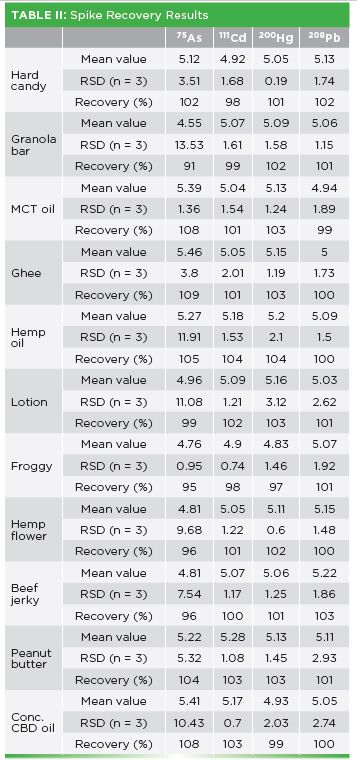Application Note: Microwave Digestion and Trace Metals Analysis of Mixed Cannabis and Hemp Products

Certain heavy metals can cause adverse effects on human health. Toxic heavy metals such as arsenic, cadmium, lead, and mercury are persistent once released into the environment and can accumulate in cannabis plants. Since hemp is a strain of cannabis (that contains very little THC), it is susceptible to bioaccumulation of heavy metals like its THC-containing counterparts. Cannabis-based products such as foods, oils, tinctures, and lotions should be tested for the presence of heavy metals to ensure consumer safety and product quality. Cannabis and CBD-infused products have grown in popularity in states that allow medicinal and recreational use of cannabis and hemp. This application note details the digestion and analysis of various forms of hemp and cannabis products for determination of trace metals content.
Instrumentation
A CEM MARS™ 6 microwave digestion system was used to digest varied cannabis and hemp sample types. The MARSXpress™ Plus vessels use a vent and reseal design, which allows for acid vapors to be exhausted while maintaining the sample integrity and elements within the vessel. The 110 mL vessel volume provides for a larger headspace, allowing a larger sample size for a more homogenous sample.
The MARSXpress Plus vessel design uses only three pieces that are easily assembled and placed in a 24-position turntable, prior to placing into the MARS 6 system.
All samples were analyzed by ICP-MS on a Shimadzu ICPMS-2030 instrument.
Procedure and Method
A variety of 11 hemp and hemp-containing samples were obtained from local retailers. Samples ranged from edibles to lotions to plant material. Solid samples required minimal particle size reduction in order to obtain a representative sample. Liquid and semi-liquid samples were digested as received.
A 0.5 g sample was weighed into a MARSXpress Plus vessel taking care to deposit the entire sample onto the bottom of the vessel. A combination of 9 mL HNO3 and 1 mL HCl was added to each vessel before the vessels were sealed and placed into the microwave. Using the preprogrammed Cannabis One Touch Method, the samples were digested at 210 °C for a total run time of 45 min, including a 20 min ramp to temperature, a 15 min hold at 210 °C, and a 10 min cool down. Upon completion of the run, samples were diluted to 50 mL with DI H2O.
All samples were run in duplicate with duplicate blanks.
A second batch of samples was run identically to the first except for the addition of a spike solution containing 5 ppb Pb, As, Cd, and Hg to all samples, duplicates, and blanks. Figure 1 shows the 11 samples analyzed in this study.
Figure 1: Samples selected for digestion and analysis

All samples were analyzed on a Shimadzu ICPMS-2330 system to determine spike recoveries and actual sample content of the “big four” heavy metals of As, Cd, Hg, and Pb. Instrument conditions are shown in Table I.

Results and Discussion
The MARS 6, with MARSXpress Plus vessels, was able to successfully digest all 24 samples and blanks in a single batch. All of the samples were completely digested, yielding clear and particulate-free solutions upon dilution with deionized water. The MARS 6 is an ideal digestion system for the cannabis industry because it is able to successfully digest batches of mixed materials, including foods, oils, tinctures, creams, and plant materials, in as little as 45 min.
The clear and particulate-free digestate solutions that were analyzed by ICP-MS showed excellent spike recovery and RSDs, as shown in Table II, indicating complete matrix decomposition by microwave digestion.

Conclusions
The MARS 6 with MARSXpress Plus vessels was able to digest a wide variety of cannabis and hemp samples in mixed batches producing digestate that was suitable for analysis. Analysis of all samples showed excellent spike recovery and repeatability. Laboratories faced with a large number of samples will be able to confidently digest a mixed batch of samples in under 1 h.
CEM Corporation
3100 Smith Farm Road, Matthews, NC 28104
Tel. (800) 726-3331
Website: www.cem.com